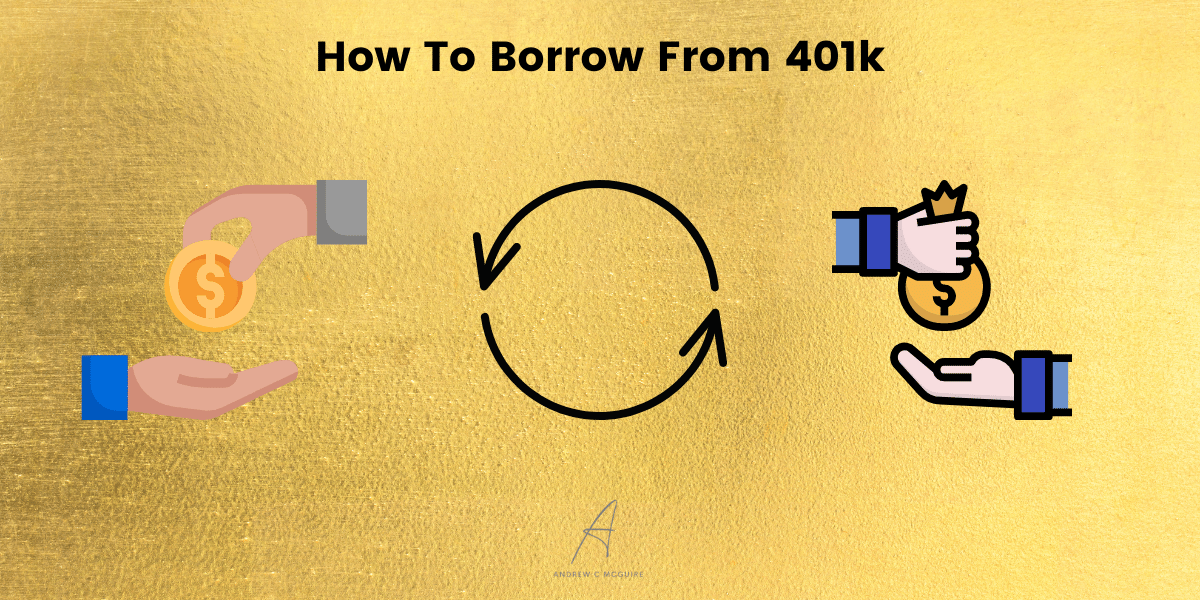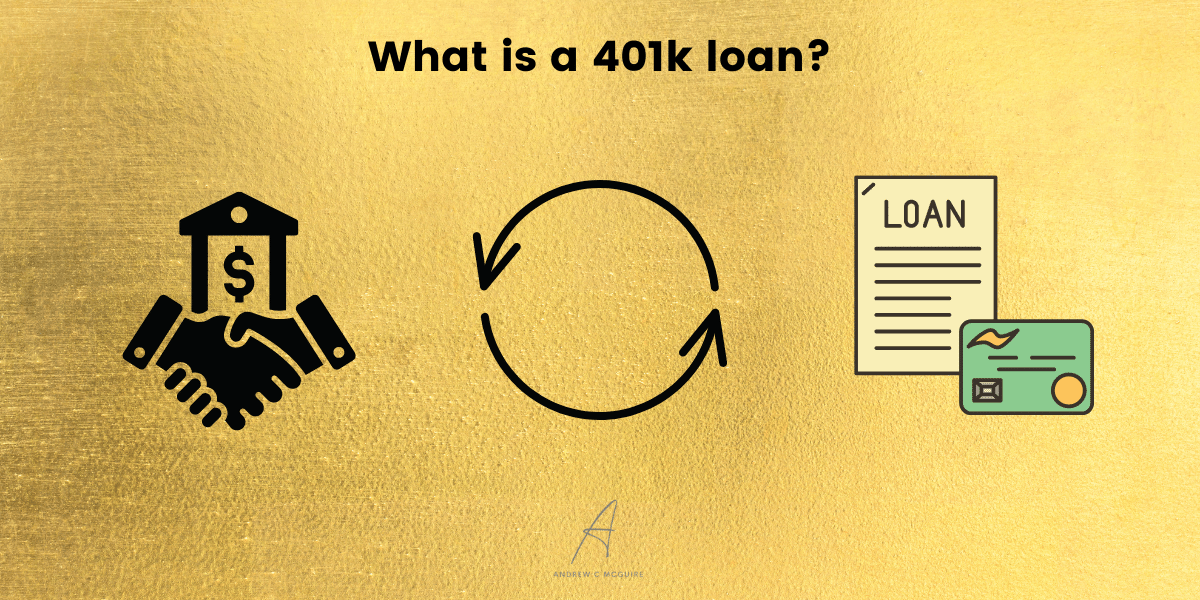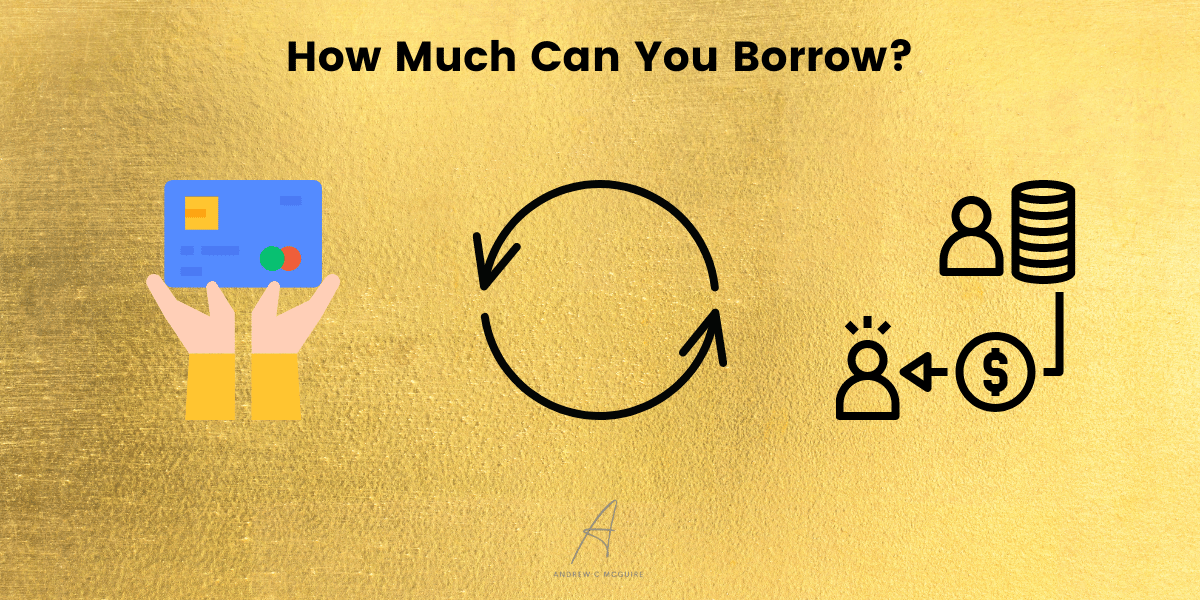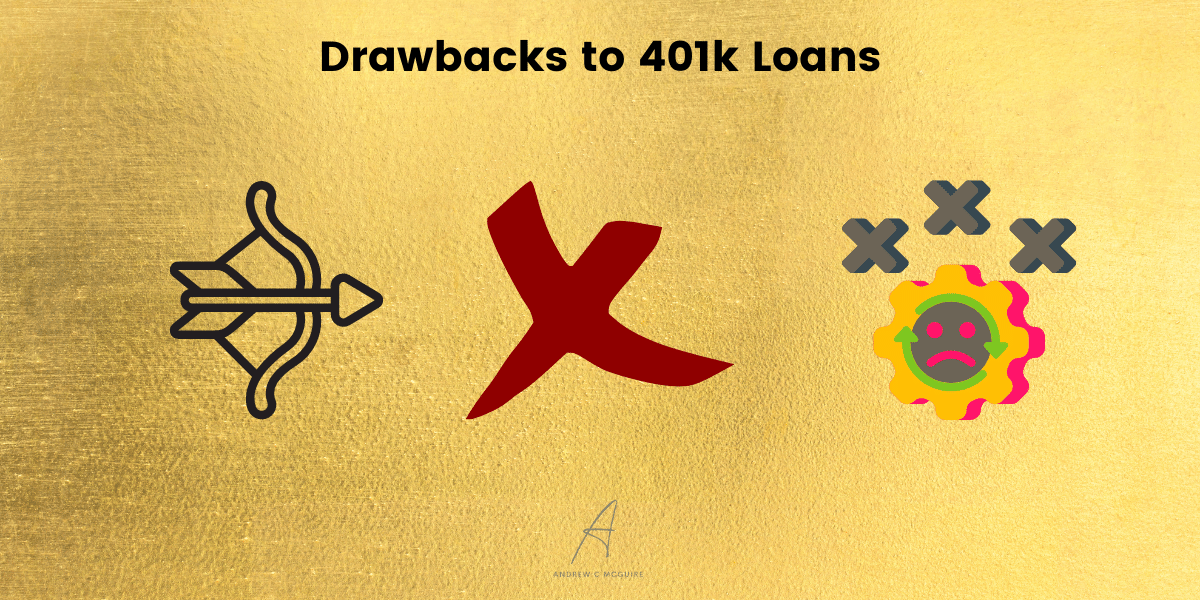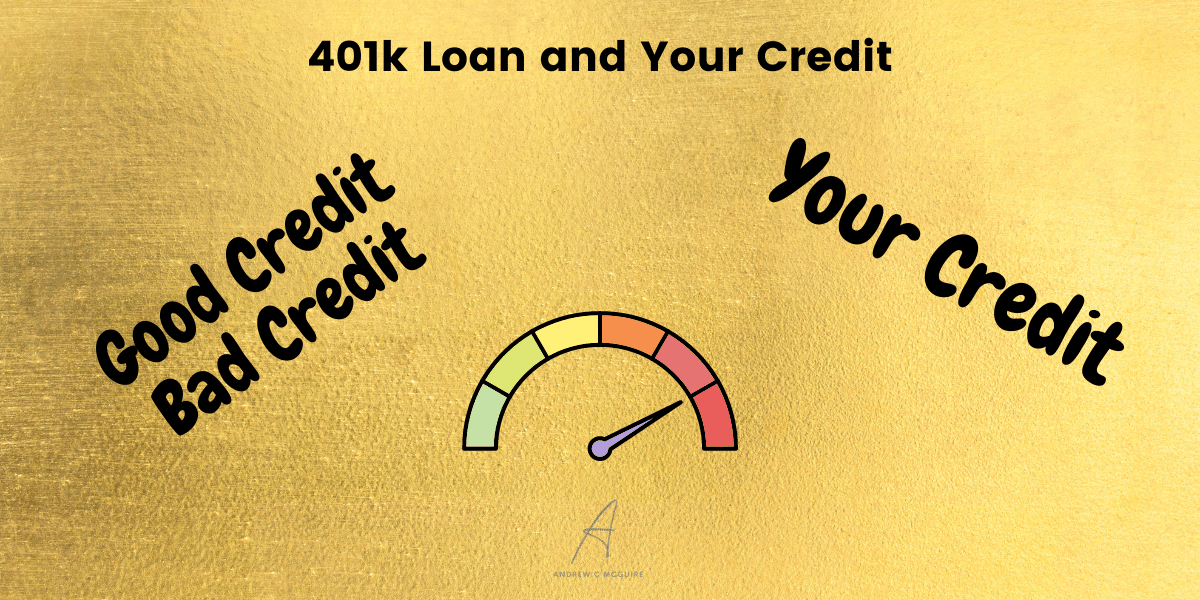As the economy continues to fluctuate, it is important for individuals looking for investment strategies to protect their wealth from inflation and a recession. One option worth considering when building an effective portfolio is borrowing money from your 401k. This can be a great way to access funds quickly while still preserving your retirement cash – but there are also some drawbacks that you should consider before taking out this type of loan.
Before we get started, I do want you to also think about moving your 401k cash into precious metals. It’s possible to open a self directed IRA and fund it where you can then own precious metals like gold and silver. Augusta Precious Metals is the best option for you to do just that.
- Money magazine’s “Best Overall” Gold IRA Company in 2022
- Quarterback Joe Montana and his financial team chose Augusta
- Zero fees for up to 10 years — every customer qualifies
- Investopedia’s “Most Transparent” Gold IRA Company in 2022
- Free guides on how to avoid gimmicks & high-pressure tactics used by gold IRA companies
We earn a commission if you make a purchase, at no additional cost to you.
In this article, I’ll discuss how borrowing from your 401k works, how much you can borrow, the potential risks associated with doing so, whether or not it affects your credit score and alternative options available if you decide against going down this route.
Take a look at how quarterback Joe Montana thinks about this and if you’re up for it, head over to the webconference that Augusta Precious Metals provides to educate you on the market.
| [presto_player id=4770] |
Joe Montana asked his financial team to find the best gold IRA company and that’s who Augusta is – the best and most trusted option.
If you want to also take a look at my article on the best gold IRA companies out there, I’d recommend taking a look at that before you decide to take a loan out from your 401k because of the potential income taxes you may have to pay.
What is a 401(k) Loan?
A 401(k) loan is a loan taken out against the balance of your 401(k) retirement account. This will allow you to borrow money from your own retirement cash without having to pay taxes or penalties on the withdrawal.
The amount you borrow depends on the plan and may range from $1,000 up to 50% of your vested account balance, with a maximum of $50,000. The interest rate charged for these loans is usually lower than other types of loans because it’s essentially borrowing from yourself. The funds are repaid through payroll deductions over a period ranging from one year up to five years depending on the plan rules.
There are some drawbacks associated with taking out a 401(k) loan including potential loss in investment returns due to reduced contributions while repaying the loan as well as potential tax consequences if you fail to repay it according to IRS regulations.
If you do need the cash for hardship withdrawal, the IRS does allow this for ‘immediate and heavy’ financial issues that come up like medical expenses, down payment for a new home or college tuition. Be careful with doing this because you may end up with an outstanding loan balance against your 401k that’s going to cause you to have to make more hardship withdrawals which just continues the cycle.
Additionally, if you leave your job before paying off the loan in full, any remaining balance will become due immediately and must be paid back within 60 days or else it will be considered an early distribution subjecting you to taxes and possible penalties.
Taking out a 401(k) loan does not affect your credit score since this type of debt is not reported by employers or lenders. However, there could still be long-term implications such as reducing future earnings potential by limiting how much money can go into investments during repayment periods which could lead to less overall wealth at retirement age compared with what would have been earned had no loan been taken out in the first place
If taking out a 401(k) Loan isn’t right for you then there are alternative options available such as using home equity lines of credit (HELOC), personal loans or tapping into other sources like cash value life insurance policies or annuities that may offer more favorable terms than those associated with traditional bank financing products. Ultimately when considering all options available it is important to weigh both short-term needs versus long-term goals so that whatever decision made best serves both interests now and down the road when planning for retirement security later in life.
A loan out of the 401(k) is a great way to borrow money for short-term needs, but it’s important to understand the associated risks before taking out a loan from your retirement. Next, we’ll look at how much you can borrow from your 401(k).
Key Takeaway
A 401(k) loan can be a good option to borrow money from your own retirement savings without having to pay taxes or penalties on the withdrawal, but it’s important to weigh both short-term needs versus long-term goals before making a decision.
Consider other alternatives such as HELOCs, personal loans and cash value life insurance policies for more favorable terms.
Additionally, any remaining balance must be paid back within 60 days if you leave your job before repayment is complete or else it will be considered an early distribution subjecting you to taxes and possible penalties.
How Much Can I Borrow?
Borrowing from your 401(k) is a popular way to access money in times of need. The amount of money that you borrow depends on the plan rules and how much money you have in your account. Generally, you can borrow close to the 50% mark of your vested balance or $50,000, whichever is less.
For example, if you have $100,000 in your 401(k), then the maximum loan amount would be $50,000 (50%). If instead you had only $20,000 in your 401(k), then the maximum loan amount would be limited to that figure ($20,000). It’s important to note that any loans taken out against a 401(k) must be repaid within five years unless it’s used for purchasing a primary residence.
It’s also important to consider that taking out a loan from your retirement savings will reduce the overall growth potential of those funds as well as reducing their ability to protect against inflation and recessionary periods. This means that while borrowing from a 401(k) may provide quick access to cash when needed it could potentially cost more over time due to lost investment returns and reduced wealth protection strategies.
It is very important to note that most employers require repayment of all outstanding loans prior to leaving their employment. Otherwise, the remaining balance may be treated as an early withdrawal which could result in taxes and penalties being applied by the IRS depending on age at time of withdrawal.
Borrowing from your 401k can be a great way to access funds for an emergency, but it is important to understand the limits and potential consequences of doing so. Next, we will discuss how you can use precious metals and gold investments to protect your wealth from inflation and recession.
Drawbacks to 401(k) Loans
You will need to pay back the loan but if you don’t for some reason, it will be treated as an early withdrawal and subject to taxes and penalties. This means that not only do you lose out on any potential gains in the account but also have to pay additional fees for taking money out of your retirement prematurely. Additionally, any interest payments made on the loan go back into your own account rather than accruing for someone else’s benefit, so there is no return on investment from this type of borrowing.
Another major drawback of a 401(k) loan is that it can reduce or even eliminate contributions to your retirement plan while you are paying off the debt. For example, if you take out a $10,000 loan with 5% interest over five years and make monthly payments of $200 each month, then during those five years you would miss out on approximately $6,000 in contributions (assuming 8% annual returns). This could significantly delay or derail your retirement plans if left unchecked.
Finally, since most 401(k) loans must be repaid within 60 days after leaving employment at that company (or face tax consequences), they may not provide enough time for individuals who need more flexibility when dealing with financial issues such as job loss or medical bills. In these cases other options such as personal loans may offer better terms and conditions depending upon individual circumstances.
In summary, although borrowing from a 401(k) can provide short-term relief in certain situations, it should always be weighed against its drawbacks before proceeding with this type of financing option. It is important to consider the potential tax consequences and missed contributions that could significantly delay or derail your retirement plans if left unchecked. Additionally, personal loans may offer better terms and conditions depending upon individual circumstances for those who need more flexibility when dealing with financial issues such as job loss or medical bills.
Overall, taking a loan from your 401(k) should be considered carefully as it can have potential drawbacks that could harm your retirement. Next, we will look at the how a 401k will affect your credit.
Key Takeaway
Borrowing from a 401(k) can provide short-term relief in certain situations, but it is important to consider the potential drawbacks before proceeding.
These include:
- 1. Tax consequences and penalties for early withdrawal
- 2. Missed contributions that could significantly delay or derail retirement plans
- 3. Interest payments going back into your own account rather than accruing for someone else’s benefit
- 4. Limited flexibility when dealing with financial issues such as job loss or medical bills (personal loans may offer better terms).
Will a 401(k) Loan Affect My Credit?
When considering taking out a loan against your 401(k), one of the questions you may have is whether or not it will affect your credit score. If you’re looking at it as a black or white question. The answer is no if you are taking out a loan against your 401(k). It does not affect your credit score since it is not reported to credit bureaus like other loans are.
However, if you default on the loan, it could affect future borrowing opportunities since lenders may view it as an indication that you are not responsible with debt repayment. For example, if you fail to make payments on time and in full for six months or more then creditors can report this information to the three major credit bureaus which can cause damage to your overall credit score.
It’s important to note that when taking out a 401(k) loan there are certain restrictions such as how much money can be borrowed and what type of investments can be made with those funds. Generally speaking, most plans allow participants to borrow up 50% of their vested balance or $50,000 whichever amount is less. Additionally, these loans must be repaid within five years unless they are used for purchasing a primary residence in which case they must be paid back over 15 years.
If you’re thinking about taking a loan against your retirement savings, it is important to consider all factors involved including potential risks associated with non-payment, so that the best decision possible can be made regarding finances going forward into retirement years ahead. Additionally, taxes and penalties may apply should you decide not to repay them according to plan terms. If payments are not made timely then any outstanding balance due will become taxable income and subject to an additional 10% penalty tax from the IRS depending on age at time of withdrawal/defaulting on payment agreement (under 59 ½).
When considering a 401(k) loan, it is important to understand the potential effects on your credit score. Next, we will explore the alternative options rather than taking out a 401(k) loan.
Key Takeaway
Taking out a loan against your 401(k) will not affect your credit score directly, however it can have implications for future borrowing opportunities if you default on the loan.
When considering this option, important factors to consider include:
- Amount able to be borrowed (up to 50% of vested balance or $50,000 whichever amount is less)
- Repayment terms (5 years unless used for primary residence in which case 15 years)
- Potential risks associated with nonpayment such as taxes and penalties.
Alternative Options
If you’re looking for an alternative to borrowing from your 401(k), there are a few options available.
1
Personal Loan
Taking out a personal loan is an option, and these loans typically come with higher interest rates than those associated with 401(k) loans. With a personal loan, you can borrow up to $50,000 depending on your credit score and income level. The repayment period of the loan will vary depending on the lender but generally range between two and five years.
2
Home equity line of credit (HELOC)
This type of loan allows you to use your home as collateral for a line of credit that can be used for any purpose. You can borrow up to 85% of your home value minus any outstanding mortgage balance, so it’s important to have enough equity in order to qualify for this type of loan. HELOCs typically will have adjustable interest rates which means they may fluctuate over time; however, they tend to be lower than those associated with personal loans or other types of financing such as credit cards or payday loans. The repayment terms also vary depending on the lender but are usually much longer than those associated with 401(k) loans – often up 10-15 years or more – making them attractive if you need funds over an extended period time.
3
Credit Cards
I hate to even put this down but you could go after a new credit card and if you can pay it down quickly. This feels like the high interest debt you’d start to rack up but it is possible to do this. If you don’t want to touch your emergency cash even if this is a financial emergency – you could open up a credit card. You’ll have to run a credit check and have to pay interest on the card if you hold a balance but that’s better (potentially) then a financial hardship loan out of your 401k.
4
Savings Account
Finally, some people choose to tap into their savings accounts when they need access cash quickly without incurring debt or having their credit checked by lenders like banks and financial institutions do when applying for traditional forms of financing such as mortgages or car loans.
While this may seem like an easy solution since it doesn’t require going through all the paperwork involved in obtaining financing from outside sources, it does mean that whatever money is taken out must eventually be replaced in order to keep saving goals on track towards retirement planning objectives.
Investing in alternative options is a perfect way to look at your portfolio and protect your wealth from inflation and recession. However, it is important to research all of the available options carefully before making any decisions.
Key Takeaway
When considering borrowing money, there are several options available aside from taking out a loan from your 401(k).
These include:
- Personal loans with higher interest rates
- HELOC which is a home equity line of credit and that uses the equity in your home as collateral
- Credit Cards
- Tapping into savings accounts. It’s important to consider the repayment terms for each option before making a decision.
Conclusion
In conclusion, borrowing money from your 401(k) is a clear option for those who need access to funds quickly. Always keep in mind what the risks associated with taking out a loan against your retirement savings. It is also important to consider alternative options before making any decisions about borrowing money from your 401(k). Ultimately, if you decide that taking out a loan against your 401(k) is the best option for you, make sure you are aware of all the details and potential drawbacks before committing to this type of financial transaction.
Best Alternative Investment
Augusta Precious Metals is the most trusted gold IRA company

